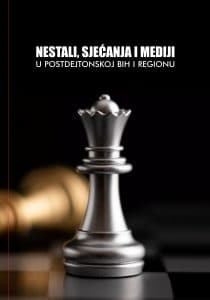 The Association for Social Research and Communication (UDIK) presents a new publication entitled “Missing Persons, Memories and Media in Post-Dayton Bosnia and Herzegovina and the Region” which aims to present the current status of missing persons in Bosnia and Herzegovina, memorialization and commemoration of war victims, and the role of the media in Bosnia and Herzegovina, but also the region. The experts on the project were: Lejla Čengić, Institute for Missing Persons of Bosnia and Herzegovina, Ibro Čavčić, journalist, and Edvin Kanka Ćudić, UDIK Sarajevo.
The Association for Social Research and Communication (UDIK) presents a new publication entitled “Missing Persons, Memories and Media in Post-Dayton Bosnia and Herzegovina and the Region” which aims to present the current status of missing persons in Bosnia and Herzegovina, memorialization and commemoration of war victims, and the role of the media in Bosnia and Herzegovina, but also the region. The experts on the project were: Lejla Čengić, Institute for Missing Persons of Bosnia and Herzegovina, Ibro Čavčić, journalist, and Edvin Kanka Ćudić, UDIK Sarajevo.
Although more than two decades have passed since the war in Bosnia and Herzegovina, the fate of more than 7,000 missing persons remains unknown. “More than 25,500 remains have been found so far, and more than 23,500 victims from the past war have been identified and their remains are buried. There are more than 2,000 unidentified remains awaiting identification at 12 morgues and autopsy centers. Therefore, addressing the issue of unidentified remains is one of the priority missions in the coming period”, said Lejla Čengić.
According to UDIK, there are more than 3,500 memorials in Bosnia and Herzegovina, Croatia, Montenegro, and Serbia dedicated to the victims of the wars of the 1990s, mostly built in the post-war period (though monuments were also built during the war). Edvin Kanka Ćudić, UDIK’s president, pointed out: “Numerous analyzes have shown that many of these monuments, but also those commemorating the victims of WWI and WWII and some earlier periods, are actually the cause of conflict in local communities and they deep existing divisions and intolerance among the locals.”
Today’s role of the media is inseparable from the role they had during the war of the 1990s. For journalist Ibro Čavčić, the following is important: “Only objective and impartial reporting in the post-conflict community can have an important role in the process of dealing with the past. Where dealing with the past is not the goal, it is impossible to talk about the role of the media in the process of achieving that non-existent goal.”
The handbook was published as the eighth book in the Memorials edition and soon will be available in numerous libraries in Bosnia and Herzegovina and the region
 UDIK Udruženje za društvena istraživanja i komunikacije
UDIK Udruženje za društvena istraživanja i komunikacije



